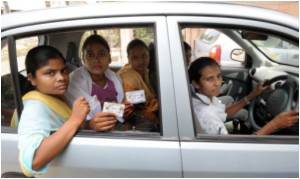The judiciary is viewed with fear in most countries across the world and India is no exception.

The wizened 52-year-old farmer has had a court case hanging over his head for the last seven years after he threatened a neighbour with an iron bar in a heated land dispute.
But the prospect of a stiff fine -- or worse -- was lifted after he agreed to hold his ears in a traditional sign of public apology and shake hands with his victim in front of a judge in the back of a bright yellow bus.
"I'm very happy that the matter has been resolved without a payment," Sheikh told AFP after negotiating the steps down from the bus into the muddy car park. "It was very quick."
Sheikh is one satisfied customer of India's first mobile court, which aims to dispense speedy justice for free in hard-to-reach rural areas and ease the burden on the country's slow-moving and chronically over-burdened courts.
On one blustery, overcast day punctuated by heavy monsoon downpours, the distinctive, bright yellow vehicle stopped in front of a community centre in Kapurhol, about 30 kilometres (19 miles) from Pune in Maharashtra state.
Advertisement
Ordinarily, such cases would be heard in the local district court but with the judicial logjam, many villagers have been waiting up to 10 years.
"They will not need to go to court to get their dispute settled... They come here with their concerns and settle matters. It helps reduce the burden of cases on the courts."
The scale of the backlog in India's judicial system is staggering.
In March this year, one senior high court judge said it would take 320 years to clear the 31.3 million cases waiting to be heard across the country -- provided no new cases are filed in the meantime.
In Pune district alone, there are 450,000 outstanding cases, said judge R.H. Mohammad, secretary of the District Legal Services Authority, as lawyers and litigants crammed into the bus, clamouring for their cases to be heard first.
A shortfall of judges, the lack of a "settlement culture" in India and the ease with which cases can be filed even on trivial matters have all been blamed for the logjam.
As a result, litigation often drags on for decades, particularly in civil matters, while judicial delays can leave people awaiting trial on relatively minor criminal charges languishing in jail for years.
Indian states, which have responsibility for the administration of justice, have as a result been seeking new ways to tackle the issue, from evening courts to mediation and arbitration schemes to settle some matters informally.
The authorities in Maharashtra decided to buy a Tata LP bus, convert it into a mobile courtroom, staff it with judicial officers, clerks and social workers and send it to far-flung corners of the state.
The van -- emblazoned with the slogan "Justice At The Doorsteps" -- hit the roads earlier this year and has so far resolved about 2,600 cases, said Mohammad.
Officials travelling on the bus also run awareness workshops for villagers who are often ignorant of their legal rights.
The mobile court itself mainly hears civil cases and some minor criminal cases but cannot pass prison sentences. Its judgments can be appealed in higher courts.
"We've had a lot of good responses from the litigants," said the Maharashtra State Legal Services Authority secretary, K.K. Sonawane, at his office in the state capital, Mumbai.
"There's been some challenge from the legal fraternity because it reduces the number of briefs. But it's not so significant. We approach the public at large on their doorstep and try to solve their problems there."
Sonawane, Kazi and Mohammad all say that the mobile court, which cost 1.2 million rupees (26,000 dollars) to set up, has been a success, so much so that they have asked the state government to fund three more buses.
If approved, they will serve areas in each area of the Bombay High Court jurisdiction -- Mumbai, Nagpur and Aurangabad.
Ultimately, Sonawane hopes to have one for every district in the state, with an emphasis on tribal areas.
Other states are watching the scheme with interest, he added.
"(The mobile court) tries to bring both parties together to resolve their problems amicably," he said. "There's lots of cases pending in courts at every level. We're trying to do our bit to reduce that dependency."
Source-AFP









